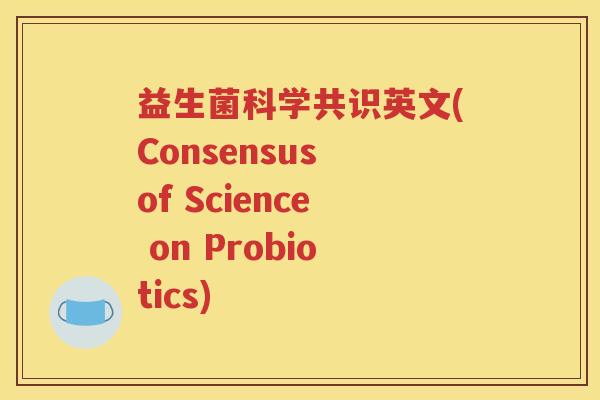益生菌科学共识英文(Consensus of Science on Probiotics)
Introduction
The use of probiotics, or live microorganisms, to improve health has gained popularity in recent years. Probiotics are known to confer several health benefits on the host, including improving nutrient absorption, enhancing the immune system, and preventing the growth of harmful bacteria in the gut. Despite the growing interest in using probiotics, there is a need to understand the consensus of science on probiotics to dispel myths and misconceptions surrounding their use. This article aims to provide an overview of the consensus of science on probiotics.
What are Probiotics?
Probiotics are live microorganisms that are consumed in adequate amounts to confer health benefits on the host. They are usually bacteria or yeasts that are similar to those found in the gut. Probiotics are found naturally in fermented foods like yogurt, kefir, and kimchi. They can also be taken as supplements in the form of capsules, tablets, or powders. The most common types of probiotics are Lactobacillus and Bifidobacterium strains.
How Do Probiotics Work?
Probiotics work by restoring the balance of bacteria in the gut. The gut microbiome contains hundreds of species of bacteria, with some being beneficial, while others can cause harm. When there is a disruption in the balance of these bacteria, it can lead to health problems. Probiotics help to restore the balance of beneficial bacteria in the gut, which in turn improves overall health. They also produce compounds like short-chain fatty acids, which have been shown to have anti-inflammatory properties.
Health Benefits of Probiotics
Probiotics confer several health benefits on the host. Some of the well-established benefits of probiotics include:

Improving digestive health: Probiotics have been shown to reduce symptoms of digestive disorders like irritable bowel syndrome, Crohn's disease, and ulcerative colitis.
Boosting the immune system: Probiotics have been shown to enhance the production of antibodies, which helps to protect against infections.
Preventing allergies: Probiotics have been shown to reduce the risk of eczema and allergic rhinitis in infants.
Improving mental health: Probiotics have been shown to reduce symptoms of anxiety, depression, and stress.
Limitations of Probiotics
Although probiotics have several health benefits, they also have some limitations. Some of the limitations of probiotics include:
Survival: Not all strains of probiotics survive the harsh acidic environment of the stomach, which reduces their effectiveness.
Dosage: The optimal dosage of probiotics is not yet known, and this can affect the effectiveness of probiotic supplements.
Strain-specific effects: Different strains of probiotics have different effects on the body, and it is essential to choose the right strain for a particular health condition.
Conclusion
The use of probiotics to improve health has gained popularity in recent years. Probiotics confer several health benefits on the host, including improving digestion, boosting the immune system, and preventing allergies. However, there are limitations to their use, including survival, dosage, and strain-specific effects. Understanding the consensus of science on probiotics is essential to dispel myths and misconceptions surrounding their use.








